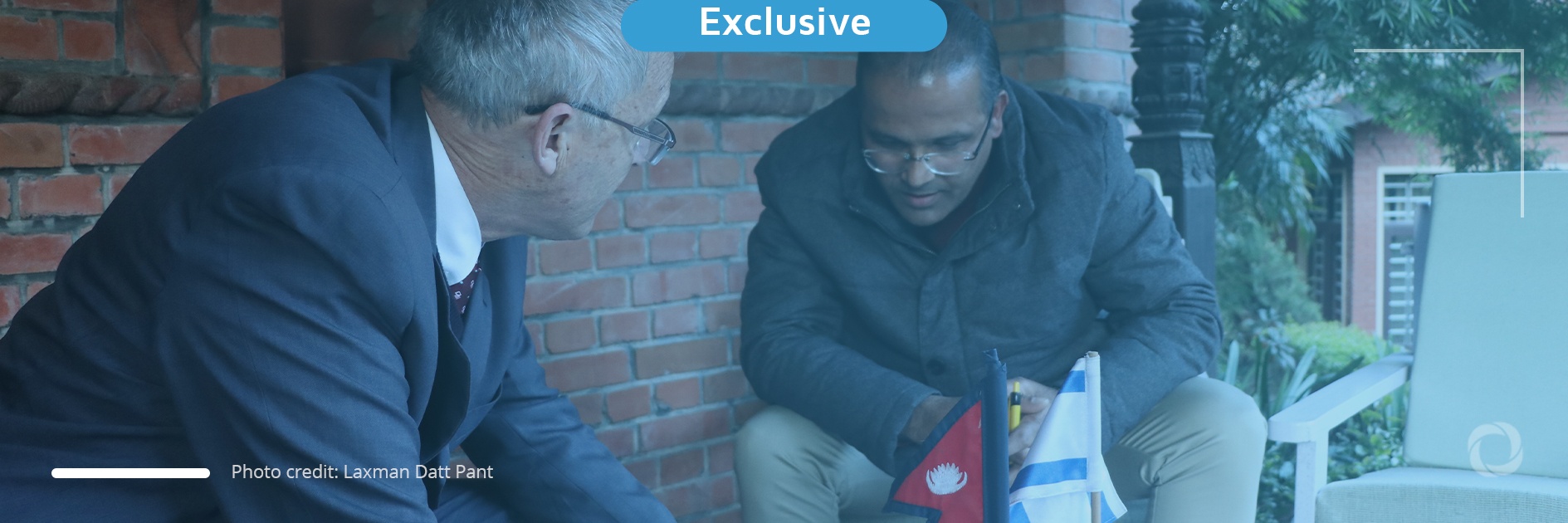Israel and Nepal have benefited from good bilateral relations for many years. Moreover, for many decades Nepal was the first and only country in South Asia to continue relations with Israel. However, the recent voting patterns on issues relating to the State of Israel at the United Nations (UN) show that multilateral relations between two countries need to improve to maintain long prized diplomatic ties.
Hanan Goder, Ambassador of Israel to Nepal, talked exclusively to the DevelopmentAid journalist for South Asia, Laxman Datt Pant, about Israel’s development priorities amid the pandemic focusing on Nepal-Israel bilateral and multilateral relations.
 DevelopmentAid: How has the COVID-19 pandemic affected Israel’s national priorities and development cooperation?
DevelopmentAid: How has the COVID-19 pandemic affected Israel’s national priorities and development cooperation?
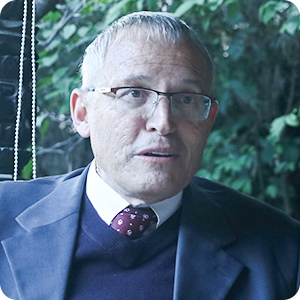 Ambassador Goder: The pandemic has affected all humanity. It has taught us all one important thing and the message we received is – our world is one, no borders. They exist but, when there are problems, they affect all of us. The lessons we learnt are important to move forward.
Ambassador Goder: The pandemic has affected all humanity. It has taught us all one important thing and the message we received is – our world is one, no borders. They exist but, when there are problems, they affect all of us. The lessons we learnt are important to move forward.
Israel was one of the first countries to take the initiative to vaccinate people and I think it is a major health priority for us. The vast majority of Israeli citizens have had the first dose, the second dose, and the booster dose of the vaccines which is crucial to keep the community safe. By the way, we are beginning to talk about a fourth dose. The lesson we are trying to share is: prevent it. And, the easiest way to prevent the pandemic is by vaccination.
As concerns development cooperation, the virtual approach is not a solution. It has already started to affect Israel’s development interventions including as a result of movement restrictions. Israel has wonderful exchange and learning programs such as taking people for scholarships in different fields. We have a major focus on health, agriculture, education, media, and gender issues, and people come to Israel representing a wide range of society.
Israel’s official international development cooperation program called MASHAV aims to share with the rest of the developing world the know-how and technologies which provided the basis for Israel’s own rapid development. Through this program, we train people who are in the middle of their careers. They come for a short period of time ranging from one to three months and learn. As the phenomena known as brain-drain is not helpful, we ensure that the professionals trained under this program go back to their countries with knowledge and new skills. We also send experts in their fields to bigger groups in all areas. So far, thousands of Nepali people have benefited from this program.
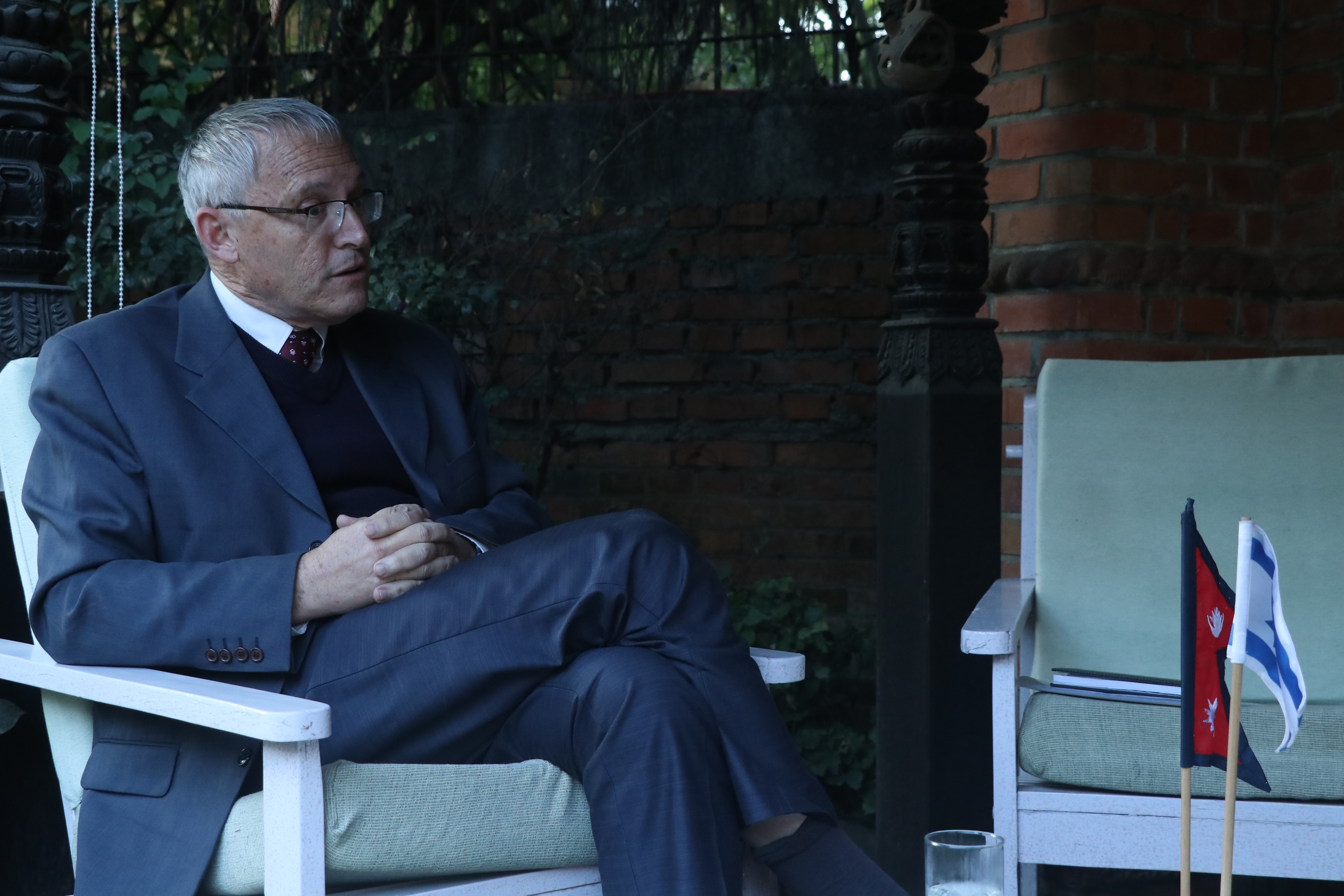
 DevelopmentAid: Could you tell us what major challenges Israel faces at the moment. How can these be dealt with?
DevelopmentAid: Could you tell us what major challenges Israel faces at the moment. How can these be dealt with?
 Ambassador Goder: First and foremost, one has to understand Israel. We are a young country – only 70 years old, with a population of just 10 million. We are a very small country which is the size of just one province of Nepal and the second thing is our location. Israel is located in Asia, but in the middle eastern part of Asia with a different culture, different environment, and different situation.
Ambassador Goder: First and foremost, one has to understand Israel. We are a young country – only 70 years old, with a population of just 10 million. We are a very small country which is the size of just one province of Nepal and the second thing is our location. Israel is located in Asia, but in the middle eastern part of Asia with a different culture, different environment, and different situation.
So, once you are located in the Middle East, you have challenges. And these challenges are not simple. However, the Middle East today is less hostile than it used to be. We have an embassy in Egypt, we have an embassy in Jordan and we have an embassy in the Emirates. We also have embassies in Bahrain and Morocco. We have had direct and indirect dialogues with so many countries of the Middle East, i.e., Sudan, Saudi Arabia. Yes, there are still radical elements in the Middle East but they are almost the minority these days. Connections of flights, connections of trade, knowledge sharing, visitors – everything is changing. And, of course, I have to add the Israeli hi-tech which is becoming the world’s leading phenomena. The hi-tech in Israel is an area that rates the highest in terms of entrepreneurship, the number of startups and research programs are all increasing. Consequently, these developments all affect Israel in a dramatic way. Today, Israel is not the Israel of 10 years ago, not at all.
 DevelopmentAid: You said that Israel is affected in many ways, mobility concerns, business, tourism, and the special security issues regarding countries in the Middle East. How do you analyze the current security concerns of Israel?
DevelopmentAid: You said that Israel is affected in many ways, mobility concerns, business, tourism, and the special security issues regarding countries in the Middle East. How do you analyze the current security concerns of Israel?
 Ambassador Goder: Before COVID-19, Israel had four million tourists per year compared to the one million who visited Nepal. This gives you the size and the importance of tourism to the Israeli economy. Yes, we have dialogues, even good dialogues, with our neighbors including with the Palestinian authorities who, despite all the differences, we have maintained cooperation and dialogue with.
Ambassador Goder: Before COVID-19, Israel had four million tourists per year compared to the one million who visited Nepal. This gives you the size and the importance of tourism to the Israeli economy. Yes, we have dialogues, even good dialogues, with our neighbors including with the Palestinian authorities who, despite all the differences, we have maintained cooperation and dialogue with.
I think the conflict should not be regarded as a religious conflict. Moderate Islam is moderate Islam and it is respected. The problem lies in the radical and extremist Islam. Let me remind you and all the readers that Israel is a democracy. At the moment, in the Israeli government, we have an Islamic party. This concept is sometimes very difficult to explain. The Islamic party is one of the parties of the ruling coalition in power at the moment in Israel. It is proof that co-existence can continue; the tolerance between Jews and Muslims, and Christians and Jews –that are also part of the equation – is possible in Israel. At the same time, it is important to open our eyes to the dangers of radical, extreme Islam, all these are challenges not only to Israel but to the world.
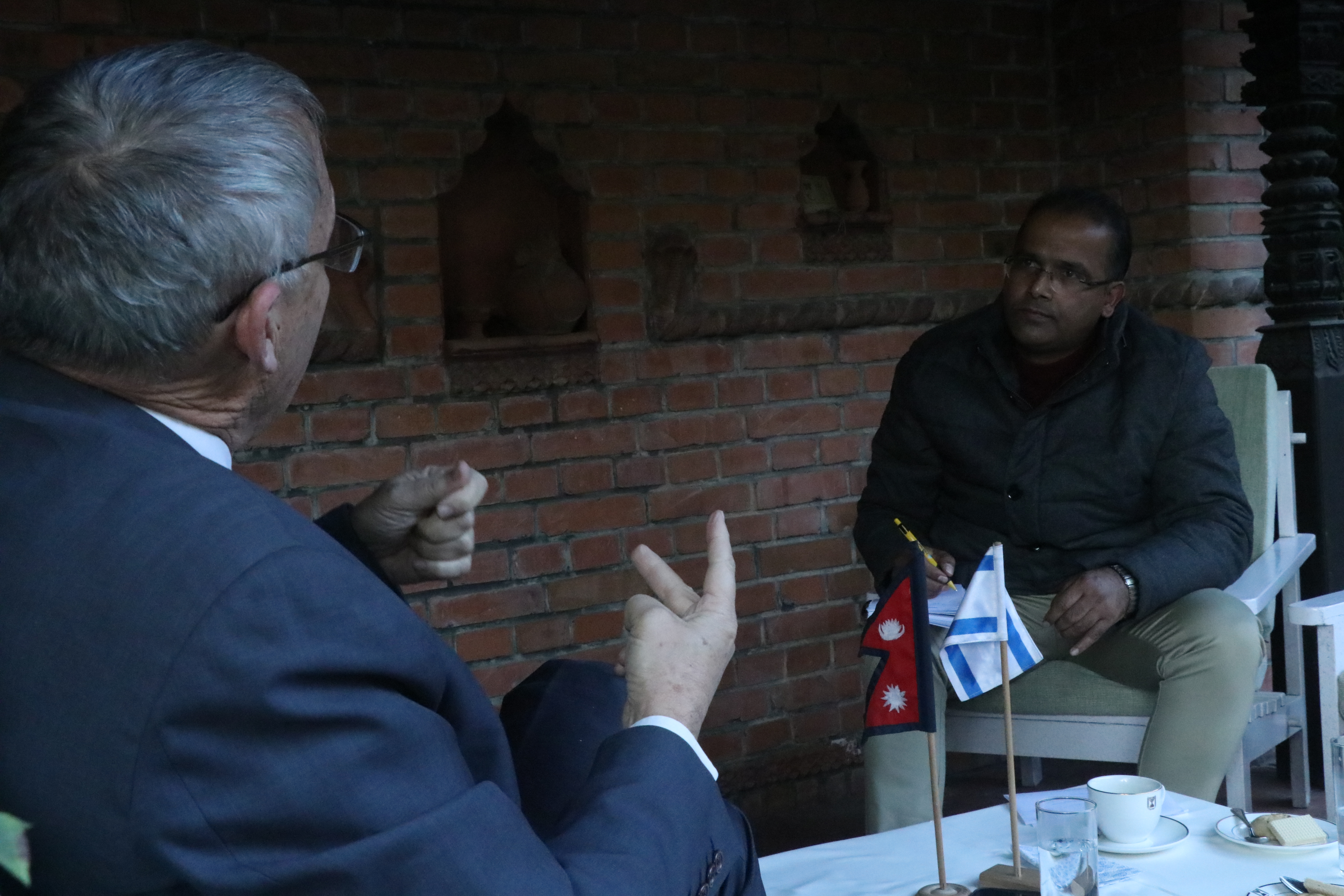
 DevelopmentAid: Since December 2020, you have served as the Ambassador of Israel to Nepal and it is your second term in this capacity. How do you view the bilateral relations and cooperation between Nepal and Israel?
DevelopmentAid: Since December 2020, you have served as the Ambassador of Israel to Nepal and it is your second term in this capacity. How do you view the bilateral relations and cooperation between Nepal and Israel?
 Ambassador Goder: There are different aspects in the word, ‘relations’. I see the changes here, I see a lot of bilateral cooperation between the countries; our relations are excellent. Many Nepali students have received scholarships to study in Israel. So far, 3,000 Nepali people have been sent to Israel for agricultural training under ‘Learn and Earn’ project that has had amazing success. They go for one year, they work and study, and they come back with money, knowledge, and the culture of work. Nepal is, by the way, changing in terms of agriculture. So, this is one aspect of bilateral cooperation.
Ambassador Goder: There are different aspects in the word, ‘relations’. I see the changes here, I see a lot of bilateral cooperation between the countries; our relations are excellent. Many Nepali students have received scholarships to study in Israel. So far, 3,000 Nepali people have been sent to Israel for agricultural training under ‘Learn and Earn’ project that has had amazing success. They go for one year, they work and study, and they come back with money, knowledge, and the culture of work. Nepal is, by the way, changing in terms of agriculture. So, this is one aspect of bilateral cooperation.
Last year, we initiated the establishment of seven excellence centers for agriculture and we are in the process of building these. The idea of these centers is to bring Israeli technology and experts in Nepal to train Nepali farmers and experts to bring change in the agricultural sector. Nepali workers are also going to Israel as caregivers. Recently, we approved more than 1,000 Nepali workers to go to Israel.
 DevelopmentAid: How do you see the position of different countries, particularly Nepal, in the United Nations forums on issues relating to the State of Israel? As Nepal was the first and only country in South Asia, for many decades, to continue relations with Israel, what aspects of bilateral and multilateral relations between two countries are crucial at this moment?
DevelopmentAid: How do you see the position of different countries, particularly Nepal, in the United Nations forums on issues relating to the State of Israel? As Nepal was the first and only country in South Asia, for many decades, to continue relations with Israel, what aspects of bilateral and multilateral relations between two countries are crucial at this moment?
 Ambassador Goder: I consider ‘multilateral relations’ as the most sensitive issue. Let me continue with the ‘bilateral’ aspect, the positive one. Investments, tourism, and hi-tech are some noteworthy issues to discuss. You know Nepali software engineers are working for Israeli companies, they are doing amazing work in hi-tech. We had 10,000 Israeli tourists coming to Nepal every year before COVID-19 and once the borders are open, they will continue to come. We would love to see the continuation of these bilateral relations.
Ambassador Goder: I consider ‘multilateral relations’ as the most sensitive issue. Let me continue with the ‘bilateral’ aspect, the positive one. Investments, tourism, and hi-tech are some noteworthy issues to discuss. You know Nepali software engineers are working for Israeli companies, they are doing amazing work in hi-tech. We had 10,000 Israeli tourists coming to Nepal every year before COVID-19 and once the borders are open, they will continue to come. We would love to see the continuation of these bilateral relations.
However, relations have two legs – one being the bilateral and the second one, ‘multilateral’. We are all aware of the bilateral relations because we see them. You see the tourists, you see the investment and the scholarships, you see the agriculture and you see the caregivers. Unfortunately, the issue of multilateral relations is less well known and multilateral relations happen mainly in New York, sometimes also in Geneva in the corridors of international organizations.
We will always appreciate the courageous act in 1960 of B. P. Koirala, the first elected Prime Minister of Nepal, who introduced a pro-Israel foreign policy. Israel now has many good friends who are supporting us at multilateral forums. Israel would like to see Nepal changing its policy in the United Nations (UN) and being more supportive to Israel. There are so many votes at the UN that are raised against Israel and we would like Nepal not to support these. When we observe the existing pattern of voting, we are frustrated and disappointed to see these excellent bilateral relations have no effect on multilateral relations.
 DevelopmentAid: What is preventing Nepal from supporting Israel’s expectations in international forums?
DevelopmentAid: What is preventing Nepal from supporting Israel’s expectations in international forums?
 Ambassador Goder: That is a good question. I have made some assumptions but this is a question you should refer to relevant people in Nepal responsible for that. The Nepali Ambassador in UN is voting as per the directions he is receiving from Kathmandu. It’s not a decision by an individual, it’s a message that you receive from here. I can assume but I really can’t understand it because the Middle East is different; the neighboring countries are much friendlier than they used to be. In some of the votes where Nepal is against Israel, its neighboring countries are neutral so we ask ourselves what has happened with this issue. Nepal and Israel will remain good bilateral friends forever and I think this is a time that good bilateral relations can have an effect on multilateral relations.
Ambassador Goder: That is a good question. I have made some assumptions but this is a question you should refer to relevant people in Nepal responsible for that. The Nepali Ambassador in UN is voting as per the directions he is receiving from Kathmandu. It’s not a decision by an individual, it’s a message that you receive from here. I can assume but I really can’t understand it because the Middle East is different; the neighboring countries are much friendlier than they used to be. In some of the votes where Nepal is against Israel, its neighboring countries are neutral so we ask ourselves what has happened with this issue. Nepal and Israel will remain good bilateral friends forever and I think this is a time that good bilateral relations can have an effect on multilateral relations.
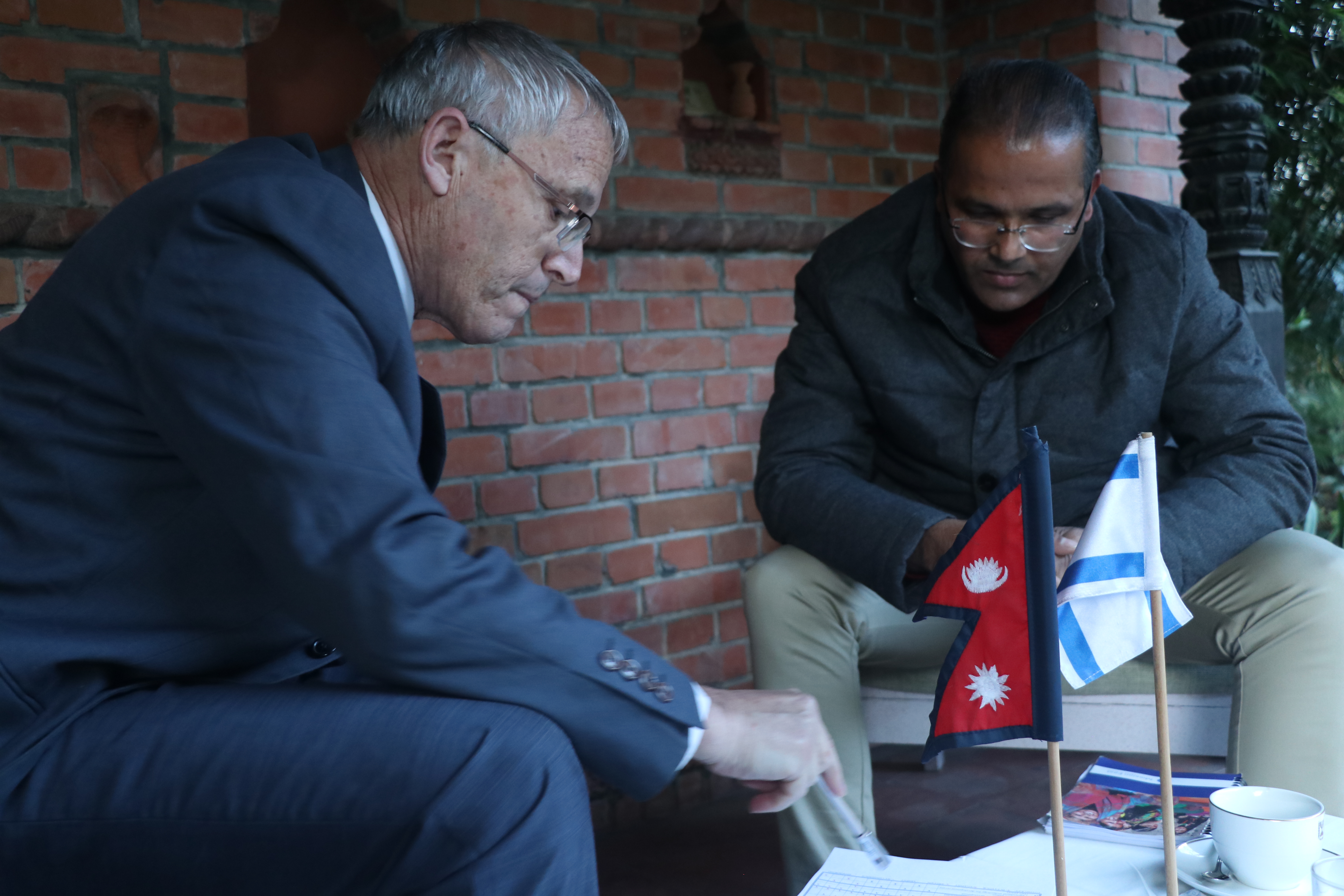
 DevelopmentAid: How would you like to see the issues of cooperation and diplomatic relations between two nations in the coming years?
DevelopmentAid: How would you like to see the issues of cooperation and diplomatic relations between two nations in the coming years?
 Ambassador Goder: When we do have dialogue, we hear from the Nepali side that Nepal is a neutral country. Nepal is a small country that has no global interest in the same way as Israel does. Nepal does its best to remain neutral in different regions of the world including Asia, Africa, and Europe except when it comes to one point – the State of Israel and its neighbors. This is something we can’t understand.
Ambassador Goder: When we do have dialogue, we hear from the Nepali side that Nepal is a neutral country. Nepal is a small country that has no global interest in the same way as Israel does. Nepal does its best to remain neutral in different regions of the world including Asia, Africa, and Europe except when it comes to one point – the State of Israel and its neighbors. This is something we can’t understand.
We will continue our excellent bilateral relations. I hope that we will continue dialogues, but we have to understand one thing: the intimacy between us is very clear and I have several explanations for that. Nepal and Israel are small goats standing next to big elephants. However, although elephants are not negative, sometimes they are careless. They don’t see they are big, strong, and powerful. The two goats surrounded by or standing next to elephants understand each other in a click. Nepal and Israel are small but proud countries. We are proud of our diversity i.e., our culture, languages, religions, heritages, natures, mountains and landscape. Let us be who we are, let us continue with what we are gaining and are proud of; we will be happy to continue with that.
 DevelopmentAid: Could you provide some insights as to why it is important for Nepal to improve its relations with Israel in multilateral fora?
DevelopmentAid: Could you provide some insights as to why it is important for Nepal to improve its relations with Israel in multilateral fora?
 Ambassador Goder: We would appreciate seeing the Nepali neutrality, that clear neutrality as demonstrated in so many parts of the world, being implemented on issues related to the State of Israel. We will be very happy to see an improvement in the existing voting patterns and that will bring a dramatic change. One has to understand that multilateral and bilateral relations are separate. Yet you can’t stand on one leg, the relationship should stand on both legs. We want Nepal to implement its stand on non-interference as one of its foreign policy principles in matters relating to the State of Israel.
Ambassador Goder: We would appreciate seeing the Nepali neutrality, that clear neutrality as demonstrated in so many parts of the world, being implemented on issues related to the State of Israel. We will be very happy to see an improvement in the existing voting patterns and that will bring a dramatic change. One has to understand that multilateral and bilateral relations are separate. Yet you can’t stand on one leg, the relationship should stand on both legs. We want Nepal to implement its stand on non-interference as one of its foreign policy principles in matters relating to the State of Israel.
